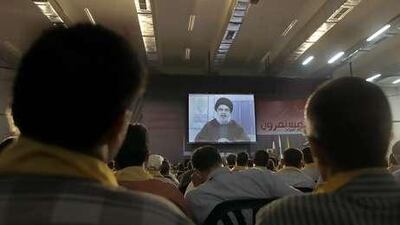BEIRUT // The recent accusations that key officials in one of Lebanon's mobile phone networks had been on the payroll of Israel not only indicates that all communications in the country have been compromised but also raises questions about whether top Lebanese officials attempted to cover up the plot, said the Hizbollah leader, Hassan Nasrallah, in a speech to supporters on Friday evening.
Speaking by videoconference in support of wounded victims of the two-decade-old Israeli-Hizbollah conflict, Mr Nasrallah said the revelations that at least two officials of the Alfa mobile carrier may have been working for Israeli intelligence were related to rumours that some Hizbollah members could be the subject of an international inquiry into the 2005 car bomb assassination of the former prime minister, Rafiq Hariri.
The Israelis, Mr Nasrallah said, "are standing by helpless before the resistance's strength and readiness and they are waiting for the [Special Tribunal for Lebanon] to create an uproar in Lebanon". "Some are bargaining on a new war caused by the indictment and I will respond to them on the anniversary of the victory in the July 2006 war," he said. "Some are counting in their analysis of the indictment on witnesses, some of whom turned out to be fake, and on the telecommunications networks which were infiltrated by spies who can change and manipulate data."
The international inquiry, which could present indictments or findings as soon as September, according to unverified media reports, used extensive phone records to draw conclusions into a conspiracy to kill Hariri, widely blamed on Syria and its Lebanese allies, in early reports. But in the past few years, there has been little information on the direction of the investigation. The intense speculation about the arrests of Charbel Qazzi and Tareq Rabaa, the two Alfa employees, raised questions, Mr Nasrallah said.
"Why did the issue of Charbel Qazzi cause such an uproar while other more dangerous agents have been arrested and no one spoke of them?" he said, drawing a connection between the mobile phones issue and the spies "and therefore, to the Special Tribunal for Lebanon and some say that STL's indictment will be against some Hizbollah members". Mr Nasrallah also connected the infiltration of the phone system, even as security officials began to claim a third accused spy was about to be charged, and the events of May 2008, when Hizbollah responded to a cabinet decision to close the group's privately controlled communications system by forcibly taking over West Beirut, driving out pro-government militias and parties and essentially violently forcing an end to a then two-year-old political struggle for control of the government. He said Lebanon's current leaders should examine the telecommunications situation and ask themselves who among them led to the May 5, 2008 decision to attempt to dismantle the network and thus, in his reckoning, forced Hizbollah to take violent action.
"We fear that those who led Lebanon to the brink of civil war on May 5 may be safe and that they may once again lead Lebanon to new dangers," Mr Nasrallah said. But in a near accusation directed towards the interior minister, Ziad Baroud, a politically non-aligned technocrat with a popular base of support across most of Lebanon, Mr Nasrallah questioned whether Lebanese officials might have previously known the activities at the Alfa network.
"Did the ISF [Internal Security Forces] intelligence bureau have information about Charbel Qazzi before he was arrested by the army intelligence?" he said. "I don't want answers because I already have them." Local media immediately reported that the ISF was investigating Mr Qazzi and had recently asked that his mobile number be put under surveillance. When the request leaked within the government, said an unnamed security official to a local paper, Lebanese military intelligence then arrested Mr Qazzi, to the surprise of the police investigators.
@Email:mprothero@thenational.ae

